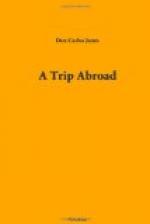The city is built on a rocky elevation rising one hundred feet above the sea, which has no harbor here, so that vessels do not stop when the water is too rough for passengers to be carried safely in small boats. Extensive orange groves are cultivated around Jaffa, and lemons are also grown, and I purchased six for a little more than a cent in American money. Sesame, wine, wool, and soap are exported, and the imports are considerable. The train reached the station about the middle of the day, and the ship did not leave till night, so I had ample time to visit the “house of Simon the tanner.” It is “by the sea side” all right, but looks too modern to be impressive to the traveler who does not accept all that tradition says. I paid Cook’s tourist agency the equivalent of a dollar to take me through the custom house and out to the ship, and I do not regret spending the money, although it was five times as much as I had paid the native boatman for taking me ashore when I first came to Jaffa. The sea was rough—very rough for me—and a little woman at my side was shaking with nervousness, although she tried to be brave, and her little boy took a firm hold on my clothing. I don’t think that I was scared, but I confess that I did not enjoy the motion of the boat as it went sliding down from the crest of the waves, which were higher than any I had previously ridden upon in a rowboat. As darkness had come, it would have been a poor time to be upset, but we reached the vessel in safety. When we came alongside the ship, a boatman on each side of the passenger simply pitched or threw him up on the stairs when the rising wave lifted the little boat to the highest point. It was easily done, but it is an experience one need not care to repeat unnecessarily.
I was now through with my sight-seeing in the Holy Land and aboard the Austrian ship Maria Teresa, which was to carry me to the land of the ancient Pharaohs. Like Jonah, I had paid my fare, so I laid down to sleep. There was a rain in the night, but no one proposed to throw me overboard, and we reached Port Said, at the mouth of the Suez Canal, the next day.
CHAPTER VII.
EGYPT, THE LAND OF TOMBS AND TEMPLES.
The Maria Teresa landed me in Port Said, Egypt, Lord’s day, October twenty-third, and at seven o’clock that evening I took the train for Cairo, arriving there about four hours later. I had no difficulty in finding a hotel, where I took some rest, but was out very early the next morning to see something of the largest city in Africa. The population is a great mixture of French, Greeks, English, Austrians, Germans, Egyptians, Arabians, Copts, Berbers, Turks, Jews, Negroes, Syrians, Persians, and others. In Smyrna, Damascus, and Jerusalem, cities of the Turkish empire, the streets are narrow, crooked, and dirty, but here are many fine buildings, electric lights, electric cars, and good, wide streets, over which vehicles with rubber tires roll noiselessly.




